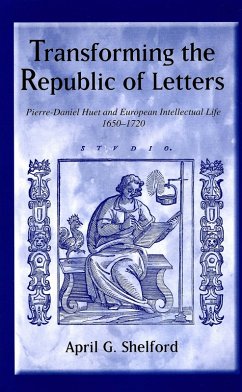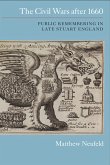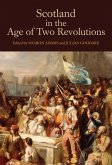A multi-faceted study of intellectual transformation in early modern Europe as seen through the eyes of a leading French scholar and cleric, Pierre-Daniel Huet (1630-1721).
Early modern Europe's most extensive commonwealth -- the Republic of Letters -- could not be found on any map. This republic had patriotic citizens, but no army; it had its own language, but no frontiers. From its birth during theRenaissance, the Republic of Letters long remained a small and close-knit elite community, linked by international networks of correspondence, sharing an erudite neo-Latin culture. In the late seventeenth century, however, it confronted fundamental challenges that influenced its transition to the more public, inclusive, and vernacular discourse of the Enlightenment.
Transforming the Republic of Letters is a cultural and intellectual history that chronicles this transition to "modernity" from the perspective of the internationally renowned scholar Pierre-Daniel Huet (1630-1721). Under Shelford's direction, Huet guides us into the intensely social intellectual worldof salons, scientific academies, and literary academies, while his articulate critiques illumine a combative world of Cartesians versus anti-Cartesians, ancients versus moderns, Jesuits versus Jansenists, and salonnières versus humanist scholars. Transforming the Republic of Letters raises questions of critical importance in Huet's era, and our own, about defining, sharing, and controlling access to knowledge.
April G. Shelford is Assistant Professor in the History Department at American University, Washington, D.C.
Early modern Europe's most extensive commonwealth -- the Republic of Letters -- could not be found on any map. This republic had patriotic citizens, but no army; it had its own language, but no frontiers. From its birth during theRenaissance, the Republic of Letters long remained a small and close-knit elite community, linked by international networks of correspondence, sharing an erudite neo-Latin culture. In the late seventeenth century, however, it confronted fundamental challenges that influenced its transition to the more public, inclusive, and vernacular discourse of the Enlightenment.
Transforming the Republic of Letters is a cultural and intellectual history that chronicles this transition to "modernity" from the perspective of the internationally renowned scholar Pierre-Daniel Huet (1630-1721). Under Shelford's direction, Huet guides us into the intensely social intellectual worldof salons, scientific academies, and literary academies, while his articulate critiques illumine a combative world of Cartesians versus anti-Cartesians, ancients versus moderns, Jesuits versus Jansenists, and salonnières versus humanist scholars. Transforming the Republic of Letters raises questions of critical importance in Huet's era, and our own, about defining, sharing, and controlling access to knowledge.
April G. Shelford is Assistant Professor in the History Department at American University, Washington, D.C.
Dieser Download kann aus rechtlichen Gründen nur mit Rechnungsadresse in A, D ausgeliefert werden.









